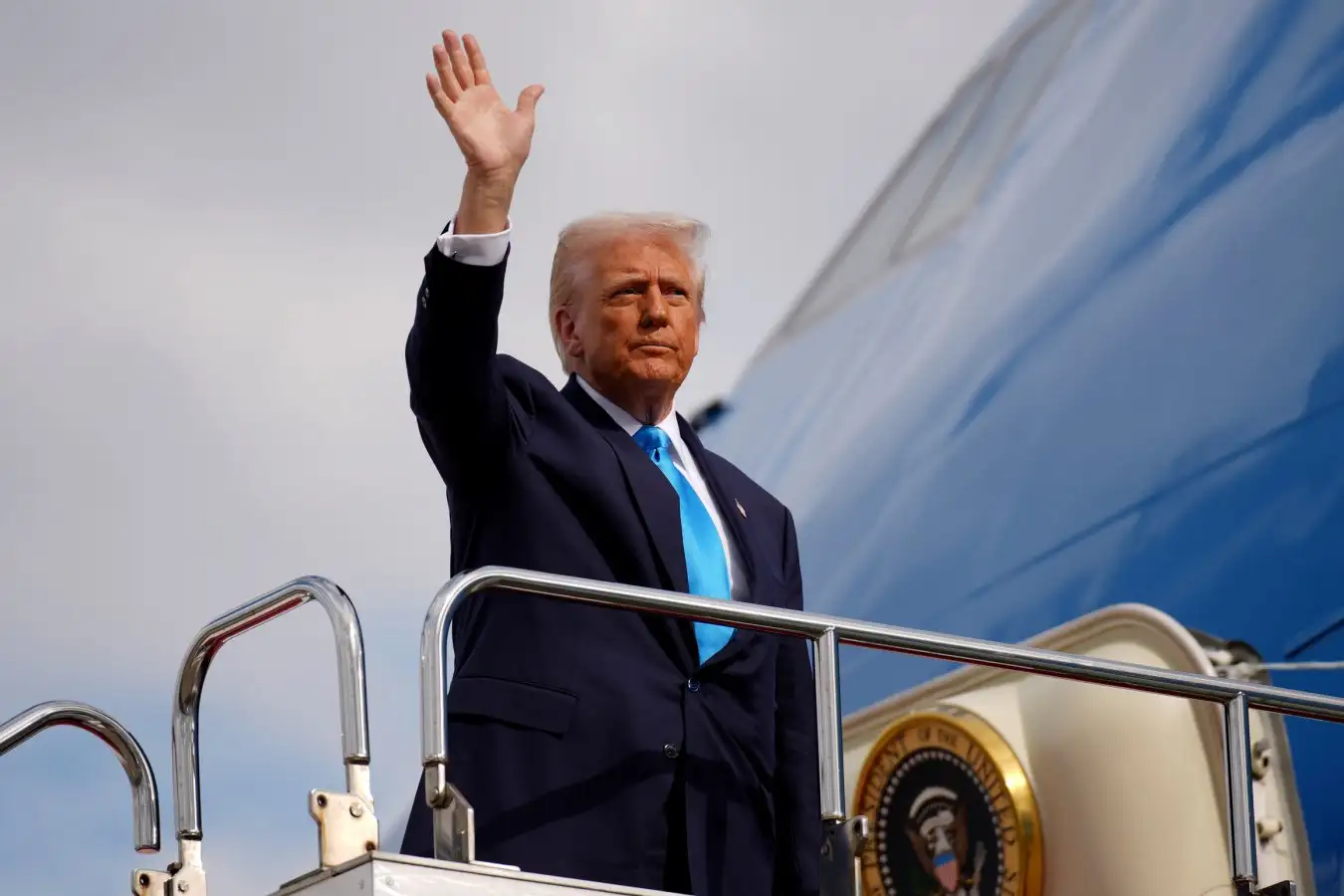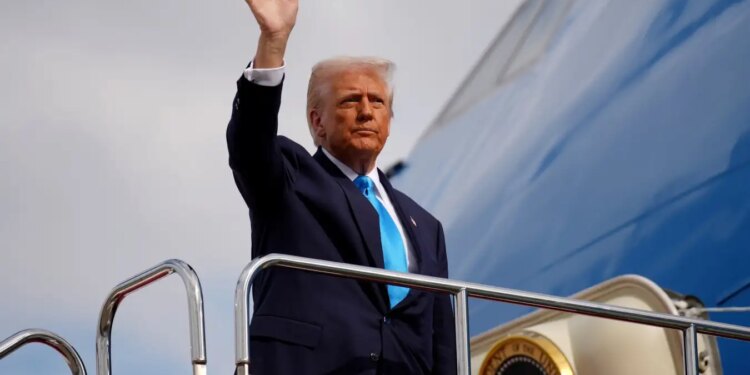
Donald Trump made his announcement before meeting with Chinese president Xi Jinping in South Korea
Andrew Harnik/Getty Images
US President Donald Trump has said that the country will resume nuclear weapons testing after a decades-long ban. But researchers speaking to New Scientist say there is no scientific need for such tests and they would be purely symbolic, unsettling for global peace and likely to spark protests among US citizens. In short, they are unlikely to happen – but that doesn’t mean the announcement is entirely benign.
Trump announced the new policy in a post on Truth Social, saying that because of “other countries [sic] testing programs, I have instructed the Department of War to start testing our nuclear weapons on an equal basis. That process will begin immediately.”
The announcement had little in the way of detail, but also confused experts because no other nation is actually testing nuclear bombs. Russia recently demonstrated a nuclear-powered underwater drone and a nuclear-powered missile, but neither were actually nuclear detonations.
Certainly, in the wake of Russia’s invasion of Ukraine, there were signs that several countries were preparing their historic nuclear weapons testing sites – whether with true intent to test once more or merely for political posturing. Modernisation work has taken place at China’s test site in the far-western region of Xinjiang, as well as at Russia’s in an Arctic Ocean archipelago and the US test site in the Nevada desert.
But new tests would run counter to decades of uneasy but effective bans. The Limited Test Ban Treaty was signed by the UK, the US and the Soviet Union in 1963, forbidding testing of these weapons in the atmosphere, underwater or in outer space, but permitting underground trials. Then, in 1996, the Comprehensive Nuclear-Test-Ban Treaty (CTBT) theoretically put a stop to underground testing too, and although it was never technically ratified, it has been effective.
More than 2000 tests took place between the first US detonation, Trinity, in 1945 and the drafting of the CTBT. Since then, India and Pakistan each carried out a handful of tests in 1998, while North Korea is the only nation to have tested a nuclear weapon in the 21st century, with its last test taking place in 2017. The US hasn’t tested a nuclear weapon since 1992.
Given that context, most experts are sceptical that President Trump – who has been vocal about his desire to be awarded a Nobel Peace Prize – would lead the US to become the first global superpower to resume nuclear testing.
John Preston at the University of Essex, UK, says the president’s statement might be little more than “Trumpian rhetoric” with no real intent to detonate nuclear weapons behind it, but warns that even this could be dangerous. Historically, Soviet and Russian strategy has been to escalate to de-escalate, he says – acting aggressively to force adversaries to take a step back.
Preston says that during the cold war, nuclear powers spent a great deal of time and energy bringing in experts from varied fields to understand exactly how nuclear arms tests and proliferation could escalate conflict. But in the years since, that has been less of a focus, and the topic has become highly secretive in general.
“In policy circles, in nuclear-strategy circles, I fear there’s probably less of an understanding of the ladder of escalation,” says Preston. “All the science is really known about the effects of nuclear weapons. There’s nothing more to know. So it would be purely symbolic and just take us up a ladder of escalation that we don’t really understand anymore.”
There would certainly be little scientific pay-off from such a move. Nuclear tests today are done extremely accurately in physics simulations on vast supercomputers. The world’s two most powerful computers (of those that are publicly disclosed, at least) are both run by the US government and are used to ensure the effectiveness of the US nuclear deterrent without having to carry out physical testing.
Christoph Laucht at Swansea University, UK, says that a resumption of testing would be a backwards step at a dangerous moment in history. The New START treaty is set to expire on 4 February 2026 and the Intermediate-Range Nuclear Forces Treaty is already over, meaning Russia and the US are just months from having no formal nuclear treaties in place, with little prospect of reaching new agreements in the current tense geopolitical climate.
“I think there is a legitimate concern that this might might be the start of a new kind of nuclear arms race,” says Laucht. “We still have a vast number of nuclear warheads, but we’re actually moving in terms of treaties to something which is comparable to the early cold war, when there was no arms limitation treaty.”
The risk is that if any one country resumes testing, others will feel compelled to follow suit, says Laucht. And testing would probably lead to protests from environmental groups, peace activists and citizens near the Nevada test site, making an already polarised US even more tense.
Sara Pozzi at the University of Michigan is blunt that resuming nuclear explosive testing makes no sense for the US. “Doing so would undermine global stability, provoke other nations to restart their own nuclear explosive testing programmes and threaten decades of progress toward nuclear arms control,” she says. “Instead, the US should continue to lead by example and help reinforce global efforts to prevent nuclear proliferation.”
There is, of course, another argument: that Trump, in characteristic fashion, has leapt to posting mercurial, unspecific and vague statements on social media that don’t tell the full story.
Nick Ritchie at the University of York, UK, says Trump may well just be talking about testing nuclear delivery technology, like the missiles that launch them, rather than warheads themselves – especially as a resumption of testing warheads would probably mean years of planning, engineering and political work that would outsee his presidency. But if that is the case, then confusion remains, as these technologies are, and always have been, tested on a regular basis, along with those of NATO allies.
“It’s a very Trumpian way of communicating on all sorts of political issues, including on very potentially destabilising and dangerous issues like American nuclear weapons policy,” says Ritchie. “There’s a fringe possibility that that I might be wrong and preparations may be very well advanced for a return to nuclear testing, but I’ve certainly seen no indications of that whatsoever.”
Topics:
Source link : https://www.newscientist.com/article/2502130-the-us-is-unlikely-to-test-nuclear-weapons-despite-what-trump-says/?utm_campaign=RSS%7CNSNS&utm_source=NSNS&utm_medium=RSS&utm_content=home
Author :
Publish date : 2025-10-30 16:10:00
Copyright for syndicated content belongs to the linked Source.









